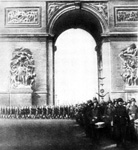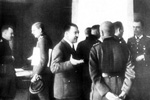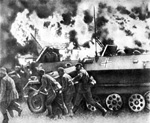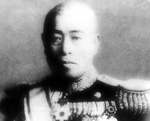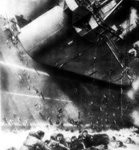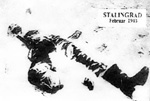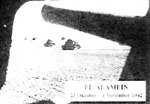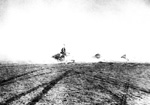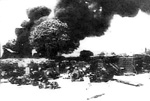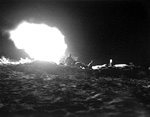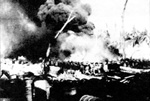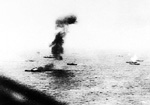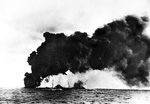Oil battle at El-Alamein
The battle for Stalingrad was the crucial one in the great fight for oil. At the same time, a deadly struggle for oil began in the vast area in the orbit of military action during World War II.
Here is a brief oil chronology from the book The Great Turn. 1942: Stalingrad and El-Alamein.
"The troops of the 6th Army reached the Volga north of Stalingrad on 23 August. Two days earlier the swastika flag had been placed on top of Elbrus. On 8 August the oil-bearing regions of Maykop which produced 2.5 million tonnes of oil annually were seized, although the Germans got oil production facilities that had been almost completely destroyed; by 25 August Kleist's tanks occupied Mozdok, 50 miles from the main oil producing centre in Groznyy and some 100 miles from the Caspian. On 31 August Hitler insisted that Field Marshal List, the commander of armies in the Caucasus, should gather all available forces for the final sudden advance on Groznyy to 'get their hands on the oil regions'. The same day Rommel began the advance at El-Alamein, confident of his ability to break through to the Nile."
In 1941 an anti-British uprising took place in India and the Germans even managed to move a small Luftwaffe detachment there through Vichy Syria, but virtually had no time to wage war there, for the British defeated the main forces of the rebels by aircraft (outdated ones) before the German aviation arrived. And the Germans could not fight properly with just air power alone, without support from the land, Henneke Kardel writes.
The British won the competition for Persian oil in August 1941, defeating the small Iranian army in three days and sending Shah Reza Pahlavi who was friendly to Germany into exile where he died soon afterwards.
The main battle (in terms of oil) occurred on 9 September, 1942 at El-Alamein when the British succeeded in inflicting defeat on the Rommel's troops and maintaining control over North Africa and the Suez Canal. That allowed a continuous supply of oil from the Anglo-Iranian Company and deprived the Germans of the chance to occupy the Persian Gulf oil deposits. Rommel wrote later, "In the conditions of a mobile war, neither weapons nor ammunition are of great importance if there are no transport vehicles with sufficient of petroleum for engines." Rommel's tragedy was the lack of petroleum in the struggle for oil! Without fuel the Deutsche Afrika Korps was doomed. Rommel's last advance simply stopped, as there was no fuel to continue.
Comparing Stalingrad with El-Alamein, Western historians made the following comment.
The oil battle at El-Alamein was of much less significance and scale than the battle for Stalingrad. There were over 50 German divisions in the Stalingrad axis in October 1942, while there were just 12 in the region of El-Alamein. But the main thing is that a deadly battle of equal forces was under way in Stalingrad, which cannot be said of El-Alamein where the British had a great advantage. At El-Alamein Rommel lost 59,000 killed, wounded and captured, 34,000 of them German, which is incomparable to the German losses of hundreds of thousands at Stalingrad numbering.
Nevertheless, Churchill considered El-Alamein more important than Paris.
The USSR ambassador to Britain, I.I. Maysky, remembers a conversation with Churchill about the second front which soon went onto Middle East oil. "Another conversation with Churchill about the second front that stuck in my memory occurred in summer 1942, while the great German advance we had expected as far back as during our March conversation was in full swing. I asked the prime minister, 'Why do you think that Egypt is easiest to protect against the Germans in Egypt? It is quite possible to protect it in Paris. Everything depends on the strategic calculation and the amount of force applied to the point of the strike.'
"Churchill flared up and started arguing fervently that I was wrong. The more he spoke, the clearer it was to me that all his considerations have a distinct trace of a passionate imperial feeling akin to the emotion that inspired Kipling.
"Churchill did not just believe Egypt was an important link in the system of imperial defensc, he was evidently in love with Egypt, Arabia, the north coast of Africa, with all that made up the Mediterranean and Middle East theatre of military operations then. Here were his heart and mind, and the names of Tobruk or El-Alamein meant more to him than the names of Le Havre or Lille. For there was oil there."
Churchill understsood what oil meant for the British Isles. Daniel Yergin writes, "No-one was fitter to govern the country in its 'darkest hour' than Churchill. No-one could imagine the significance of oil, first of all for the very existence of Britain, and then for the conduct of a protracted war, better than Churcill did." Nonetheless, it is fair to say that a British defeat at El-Alamein would not have meant the loss of all the Middle East's oil - if they had lost, major problems would have arisen in the region.
Some experts even believe that the battle at the approaches to Cairo was more important than El-Alamein, "However, if the battle near Cairo had ended differently (and there was a considerable chance of it), we would have felt the effect ourselves very quickly. Had the Germans broken through the Suez Canal to the Middle East, they would have received the almost guaranteed support of the Arabs, the Turks and the Persians; as a result in the heat of the Stalingrad battle Rommel would have approached Baku from the south. If the USSR had lost Caspian oil, the outcome of the war would have been at least uncertain, all the more so as Great Britain would have certainly got out of the war," they say. El-Alamein and Stalingrad can be compared only in terms of oil, as oil production and explored reserves in that region were already considerable at that time. But they are incomparable in scale, severity and many other aspects. A "gentlemen's war" was being conducted here, with none of the horrors of the Eastern front. Montgomery had a portrait of Rommel in his office, as the British thought Rommel a general "lit by the sun". The battles for Stalingrad and El-Alamein are "two big differences", as they say in Odessa! There were hundreds such battles on the Soviet-German front, with no hint of gentlemanly conduct!
Next...
